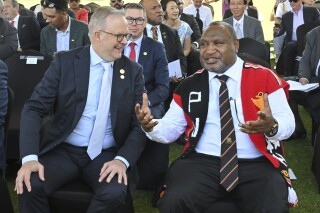Albanese Fails to Secure Defense Pact with Papua New Guinea

UPDATE: Australian Prime Minister Anthony Albanese has just concluded a crucial visit to Papua New Guinea without securing an anticipated defense treaty, a major setback as Australia faces increasing regional tensions.
The failure to finalize this treaty, which was expected to bolster security cooperation against China’s growing influence, follows another diplomatic disappointment last week when Albanese could not finalize a similar pact with Vanuatu. Both incidents raise urgent questions about Australia’s strategy in the South Pacific.
During his three-day visit to Port Moresby, Albanese aimed to sign a bilateral defense treaty but left with a promise that the text was agreed upon. A Papua New Guinea Cabinet meeting, initially scheduled for Monday to endorse the treaty, never took place, leading to the current impasse. Instead, Albanese and Papua New Guinea’s Prime Minister James Marape issued a communique stating that the treaty would be signed “following Cabinet processes in both countries.”
Albanese’s attempts to solidify Australia’s influence in the region come just ahead of his potential first in-person meeting with U.S. President Donald Trump next week, where regional security issues will be a central topic. Trump recently indicated his anticipation of the meeting while criticizing the Australian media.
“Democracies aren’t the same as authoritarian regimes. They go through processes. We respect them,” Albanese responded to a reporter questioning his approach. He emphasized that both nations would adhere to their respective decision-making processes.
In a parallel situation, Albanese had hoped to sign a bilateral security and economic treaty during his visit to Vanuatu on September 9, but left with a commitment to continue negotiations. Vanuatu’s Prime Minister Jotham Napat expressed concerns over the treaty potentially limiting the nation’s ability to engage with other countries, particularly China, for critical infrastructure funding.
Marape reassured reporters that the delay is not influenced by external pressures, notably from Beijing. “Please let’s give respect to China,” Marape stated. “This (delay) is in no way, shape or form because Chinese have any hand in saying: Don’t do this.”
The treaty with Papua New Guinea would elevate the country to become Australia’s third security alliance partner, following the United States and New Zealand. Australia’s efforts to strengthen relations with Pacific nations intensified after a security agreement was signed between Beijing and the Solomon Islands in 2022, raising fears of a potential Chinese naval base in the region.
As the geopolitical landscape continues to evolve, the lack of a formal agreement with Papua New Guinea signals a critical moment for Australia’s foreign policy. With increasing challenges to its influence, the immediate future will depend on how quickly and effectively these treaties can be finalized.
Albanese’s upcoming meeting with Trump is expected to occur during the United Nations General Assembly in New York next week, although his office has not confirmed details. Observers will closely watch how these diplomatic discussions unfold against a backdrop of regional security concerns.
The situation remains fluid, and further updates are anticipated as both leaders navigate the complexities of international relations in the Pacific.






